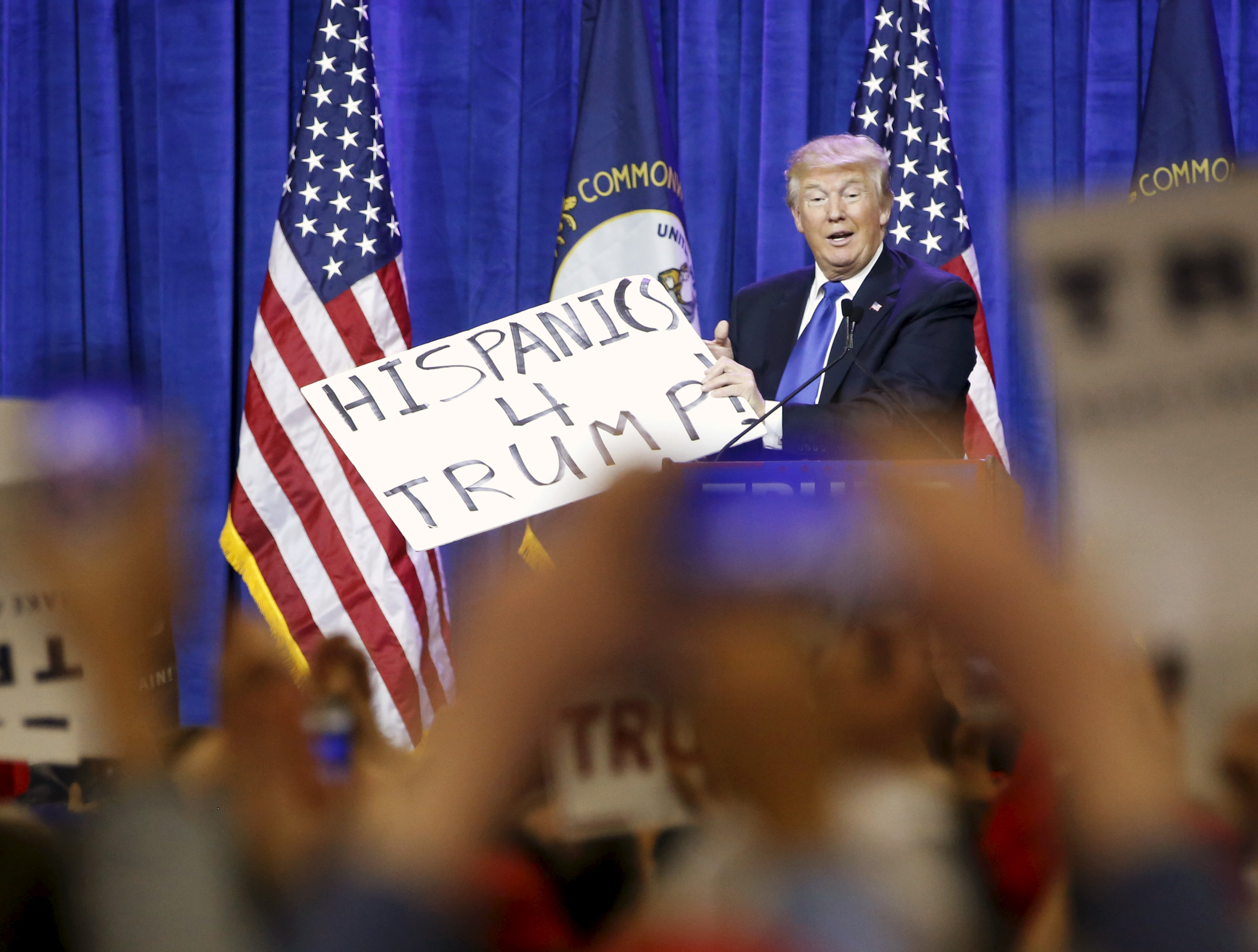Donald Trump's new plea to minorities: You're pathetic, so vote for me
This has to be the worst "outreach" in history


Every Republican knows that he starts off any campaign with many minority voters assuming by default that he isn't on their side. That assumption might be altered by what happens in the campaign, but in the absence of any other information it will hold. Depending on where that Republican is running, it might or might not be a problem; if it's an overwhelmingly white district, or even one that has plenty of minorities but also has a reliably Republican white population, there's not much need to reach out to African-Americans or Latinos or Asian-Americans.
That works fine as long as you're talking about, say, a congressional district in Kansas or the state of Alabama. But if you're running for president, you have to win at least some minority votes. You don't need anything approaching a majority of them, but to win, you need just enough of the non-white electorate to make up for the white liberals who will vote Democratic.
So it made sense that at some point, Donald Trump would reach out to non-white voters. What doesn't make sense is how he's doing it. Trump's brand of outreach is to tell them that their lives are pitiful and frightening, and only he can save them.
The Week
Escape your echo chamber. Get the facts behind the news, plus analysis from multiple perspectives.

Sign up for The Week's Free Newsletters
From our morning news briefing to a weekly Good News Newsletter, get the best of The Week delivered directly to your inbox.
From our morning news briefing to a weekly Good News Newsletter, get the best of The Week delivered directly to your inbox.
How do you think that's going to go over?
We've now seen this on multiple occasions: Trump will give a speech in some all-white suburb and go on a rant about how terrible African-Americans or Latinos are doing, then suggest that the people he has just belittled ought to vote for him. "The Democrats have failed completely in the inner cities," he told an audience in Ohio this week. "Poverty. Rejection. Horrible education. No housing, no homes, no ownership. Crime at levels that nobody has seen. You can go to war zones in countries that we are fighting and it's safer than living in some of our inner cities that are run by the Democrats." He went on, "Look, it is a disaster the way African-Americans are living, in many cases, and, in many cases the way Hispanics are living, and I say it with such a deep-felt feeling: What do you have to lose? I will straighten it out. I'll bring jobs back. We'll bring spirit back. We'll get rid of the crime. You'll be able to walk down the street without getting shot. Right now, you walk down the street, you get shot." A couple of days before, he described the lives of African-Americans as "a total catastrophe."
This is, to say the least, not the way politicians ordinarily reach out to groups of voters. A different politician would say to African-Americans or Latinos not that they and the places they live are despicable, but that he understands them. He'd meet with them, talk to them, listen to them. He'd find ways to communicate that understanding and empathy, say by walking around neighborhoods where many of them live and stopping in at notable local eateries. That kind of photo-op campaigning may be shallow in its way, but it's meant to operate as an easily-understood shorthand that says, "I get it."
But Trump can't manage that — and in fairness, if he went to a heavily African-American or Latino neighborhood, chances are he'd be booed and heckled, which wouldn't make for such a great image on the news. The problem is that he's trying to undo everything he's done so far during the campaign: the talk about Mexicans being rapists, about a judge being biased against him because of his Latino heritage, about banning Muslims from the country — not to mention the retweeting of white supremacist imagery meant to stir up fears of black criminality.
A free daily email with the biggest news stories of the day – and the best features from TheWeek.com
Even if he tried to do it in a less ham-handed way, would it be possible for Trump to make African-Americans forget that he's America's most prominent birther? That the country's first African-American president had to literally show his birth certificate to prove to people like Donald Trump that he's really American? That to this day Trump hasn't said that he believes Barack Obama is American? That Trump has also demanded to see Obama's college transcripts, because he refused to believe that Obama got into Harvard Law School on merit? When he says to them, "What do you have to lose?" they know that the answer is, plenty.
The same goes for Latinos: Unlike previous Republican candidates, Trump can't bring himself to reach out to them with anything beyond a condescending message that says if they knew what was good for them, they'd be voting for him. But even if he tried something more subtle, they too would be unable to forget everything he has done and said to this point.
The last Republican to make serious inroads among Latinos was George W. Bush, and he did it with a message — "compassionate conservatism" — that may have been substantively hollow, but on a personal level it was sincere. Bush was a friendly guy who liked nothing better than giving out hugs to people of all races. What more astute observers realized at the time was that the real target of "compassionate conservatism" was white moderates, who wanted to be reassured that Bush was a moderate, too. Along the way, Bush picked up a healthy number of Latino votes — not a majority, but enough to help him win the presidency twice.
The consensus now is that Trump's "outreach" to minorities is likewise aimed at whites. But which whites? Are moderates going to be reassured that Trump is a nice guy when he talks about African-Americans as though they're all poor, uneducated, unemployed, and violent? When he paints them like a menacing gang out of one of the Death Wish movies, with him as Charles Bronson getting ready to blow them away, whose votes is he winning?
Perhaps this is little more than an extension of Trump's larger "America: What a Rathole" strategy, where he describes the country as a pit of despair populated by losers who can't get anything done. But this feels much more personal. And like that larger message, it's utterly disempowering. It says that you're pathetic, weak, and contemptible, and the only way you can change your circumstance is by giving Donald Trump free rein to fix everything on your behalf.
Right now Trump is polling in the single digits (sometimes the low single digits) among African-Americans, and only slightly better among Latinos. This round of "outreach" seems unlikely to change that. What's really inexplicable is that he's reaching out in a way that almost seems designed to alienate not just the people whom he's supposedly talking to, but the white voters in the middle he needs if he's to have any chance of winning. All in all, it seems like a typical Trump strategy.
Paul Waldman is a senior writer with The American Prospect magazine and a blogger for The Washington Post. His writing has appeared in dozens of newspapers, magazines, and web sites, and he is the author or co-author of four books on media and politics.
-
 Bari Weiss’ ‘60 Minutes’ scandal is about more than one report
Bari Weiss’ ‘60 Minutes’ scandal is about more than one reportIN THE SPOTLIGHT By blocking an approved segment on a controversial prison holding US deportees in El Salvador, the editor-in-chief of CBS News has become the main story
-
 Has Zohran Mamdani shown the Democrats how to win again?
Has Zohran Mamdani shown the Democrats how to win again?Today’s Big Question New York City mayoral election touted as victory for left-wing populists but moderate centrist wins elsewhere present more complex path for Democratic Party
-
 Millions turn out for anti-Trump ‘No Kings’ rallies
Millions turn out for anti-Trump ‘No Kings’ ralliesSpeed Read An estimated 7 million people participated, 2 million more than at the first ‘No Kings’ protest in June
-
 Ghislaine Maxwell: angling for a Trump pardon
Ghislaine Maxwell: angling for a Trump pardonTalking Point Convicted sex trafficker's testimony could shed new light on president's links to Jeffrey Epstein
-
 The last words and final moments of 40 presidents
The last words and final moments of 40 presidentsThe Explainer Some are eloquent quotes worthy of the holders of the highest office in the nation, and others... aren't
-
 The JFK files: the truth at last?
The JFK files: the truth at last?In The Spotlight More than 64,000 previously classified documents relating the 1963 assassination of John F. Kennedy have been released by the Trump administration
-
 'Seriously, not literally': how should the world take Donald Trump?
'Seriously, not literally': how should the world take Donald Trump?Today's big question White House rhetoric and reality look likely to become increasingly blurred
-
 Will Trump's 'madman' strategy pay off?
Will Trump's 'madman' strategy pay off?Today's Big Question Incoming US president likes to seem unpredictable but, this time round, world leaders could be wise to his playbook



